¶ Directions
Direction can be measured in various ways. All directions are measured clockwise in degrees from 0º to 359º. In all cases the direction "To" or "From" a position will be measured with reference to a particular datum, usually North.
There are four main types of direction, referred to Air Navigation:
- Degrees True (ºT): Relative to True Heading (TH).
- Degrees Magnetic (ºM): Relative to Magnetic Heading (MH).
- Degrees Compass (ºC): Relative to Compass Heading (CH).
- Degrees Relative (ºR or ºRel): Relative to a known position.
¶ True direction
True direction is measured with respect to True North (TN), which is the direction of the Geographic North Pole from a place.
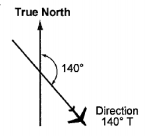
The direction of the True North is indicated by the meridian at the actual place where the measurement is made, since meridians always run in a North/South direction.
Navigation charts and maps are usually based on True Directions.
¶ Magnetic direction
The Earth may be considered as a magnet producing an irregular magnetic field with North and South Poles. Those Poles are near to the geographic poles but may not be directly opposite each other. The Magnetic Poles move constantly, completing a full rotation of 360º each 960 years.
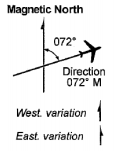
When a magnetized compass needle is freely suspended in the magnetic field of the Earth, it will align itself along the magnetic field, indicating the direction of the Magnetic Poles at that place. The magnetic imaginary lines that connect North and South Magnetic Poles are known as magnetic meridians.
The Magnetic Direction is measured with respect to Magnetic North (MN), which is the direction of the Magnetic North Pole from a place.
Error-free compasses (also known as Direct Indicating Compasses) show Magnetic Heading (MH).
¶ Compass direction
Any magnetic or ferrous material or electrical equipment on or near the aircraft compass will affect the local magnetic field and may deflect the compass needle away from the Magnetic North (MN). This means that the Compass may not show Magnetic Heading accurately.
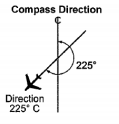
When a compass is affected by a local magnetic field, it points to that Compass North. Normally, there is a deviation chart near to each Compass where deviation can be seen.
Note that this deviation may not be simulated on our simulators.
¶ Variation and deviation
The angle between the True North (TN) and the Magnetic North (MN) is called 'variation'.
It is measured from the TN to the MN. If the Magnetic North is west of the True North, variation is west, and vice versa.
Example: If MN is 4º west of TN, variation is 4º W or -4º If MN is 8º east of TN, variation is 8º E or +8º
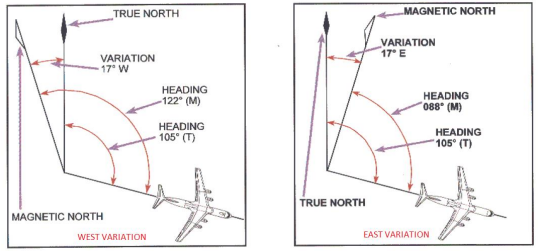
The angle between the Magnetic North (MN) and the Compass North (CN) is called 'deviation'.
It is measured from the MN to the CN. If the Compass North is west of the Magnetic North, deviation is west, and vice versa.
Example: If CN is 3º west of MN, deviation is 3º W or -3º If CN is 5º east of MN, deviation is 5º E or +5º.
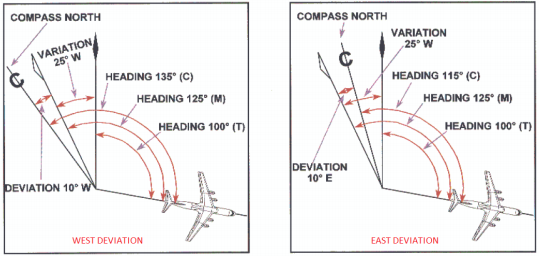
¶ Relative direction
A Relative Bearing (RB) is a bearing measured with respect to the nose of the aircraft or to the aircraft Magnetic Heading (MH).
They are used mostly on ADF equipment to obtain the station's relative position.
Bearings can be FROM the aircraft TO the station or FROM the station TO the aircraft. They are always measured clockwise.
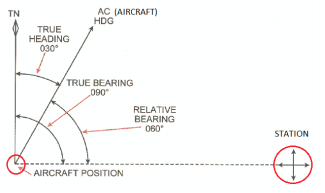
In order to calculate Magnetic Bearing (MB), this formula can be used, from the aircraft to the station:
RB + MH = MB Relative Bearing + Magnetic(true) Heading = Magnetic(true) Bearing
¶ Reciprocal bearing
The reciprocal of a direction is the reverse direction, which has a difference of 180º. It can be obtained by adding or deducting 180º to the MB to the station, whichever results in a number smaller than 360º.
Example: If the Magnetic Bearing from the aircraft to the station is 250º, the reciprocal is 250º - 180º = 070º.
Note that if we add 250º + 180º = 430º, we do not obtain a valid bearing as it is greater than 360º.
¶ Q-codes used in Navigation
In navigation documents, there are some Q-codes that abbreviate the mostly used bearings:
- QDM: Magnetic Bearing TO the station (from the aircraft)
- QDR: Magnetic Bearing FROM the station (to the aircraft)
- QUJ: True Bearing TO the station (from the aircraft)
- QTE: True Bearing FROM the station (to the aircraft)
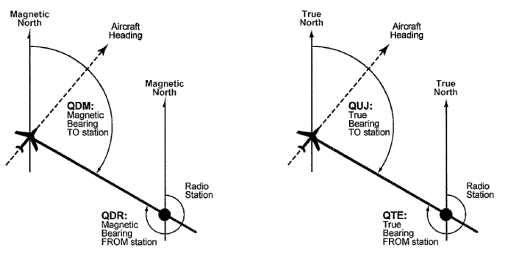
- None
- None
- VID 150259 - Creation
- VID 450012 - Wiki Integration
- VID 496402 - Wiki.js integration